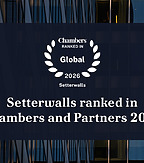Article | 1 December 2014
Fund Hotels

The increase in the number and complexity of the regulations applying to the European financial sector is resulting in a need to keep costs down while complying with all legal requirements.
This is important because of the need to maintain a minimum level of profitability and to secure investor access to reasonably priced European financial products.
Different operators have different ways of dealing with this issue. In the fund industry, developments in applicable regulation in recent years have resulted in the ability to use arrangements such as master and feeder funds. These types of construction enable administrative, legal and compliance costs to be kept down. Another way to keep these costs lower is to use what are known as ‘fund hotels’, which are becoming more common in Sweden.
This article uses the term ‘hotel’ to describe a fund management company that takes over the legal responsibility for fund administration. The term ‘guest’ is used for the ‘old’ fund management company, which after the transaction must – at the very least – be approved by the FSA to carry out discretionary portfolio management. (1)
In the figure below, the hotel is a Swedish fund management company approved and supervised by the FSA. The investment funds are managed in all respects by the hotel and they ‘belong’ to the hotel. For example, the hotel can permanently transfer the management of the investment funds to another fund management company or terminate the management of the fund altogether.
A fund management company is responsible for all functions relating to an investment fund. In addition to the management of the assets in the investment fund and the marketing of the fund (portfolio management/marketing), a fund management company is also responsible for such things as regulatory and compliance requirements, contact with the FSA, handling of payments to and from unit holders, issuance and redemption of fund units and risk management (‘fund administration’). It is this latter function, fund administration, that typically is of interest to a fund management company wishing to transfer its funds to a hotel.
In the figure below, the original management company of Fund C has come to the conclusion that it would be best to focus on what was originally thought to be the distinguishing quality of its fund – portfolio management.
Using the hotel/guest construction, (‘fund hotel outsourcing’) this is achieved through the following steps:
- The guest transfers the management of Fund C to the hotel. This transfer requires a permit from the FSA.
- The hotel then outsources the portfolio management and the marketing of Fund C back to the former portfolio managers. Such outsourcing can only be made to a legal entity which has permission from the FSA either to act as a fund management company or to carry out discretionary portfolio management. The FSA must be notified of the outsourcing arrangement and the written outsourcing agreement must be submitted to the FSA.
Ordinary outsourcing vs fund hotel outsourcing
As pointed out above, step two of fund hotel outsourcing involves an outsourcing of the portfolio management ‘back’ to the fund’s previous managers. Outsourcing the portfolio management of an investment fund through an investment management agreement is nothing new in the fund industry and has long been a way of securing access to specialised portfolio management expertise for ‘real’ fund management companies. In cases of ordinary outsourcing it is in reality (and not just legally) the outsourcing fund management company that has all the interests relating to the investment fund and the unit holders. The portfolio manager that takes on the obligations to manage the portfolio ‘only’ has the interests of earning its fees and will typically have no rights in relation to neither the investment funds nor the unit holders. In a fund hotel outsourcing situation, it is the other way around: the legal fund management company – the hotel – has no interests (other than a legal interest) in the investment fund or the unit holders. Its only interests are in earning its fees and complying with its legal obligations so that it can continue to take on guests and earn fees. Instead, the ‘real’ interests relating to the investment fund/funds and the unit holders still lie with the guest.
However, looking at the structure from a strictly legal point of view provides another picture and it is this discrepancy between the legal and the real positions that needs to be regulated in agreements between the hotel and the guest.
The blue arrow between the hotel and the guest in the figure below represents the ‘new’ legal issues that arise in this situation. We deal with some of these issues below.
Employment-law related issues
The most important reason for a guest to engage in fund hotel outsourcing is to reduce the guest’s fund administration costs. Depending on how the guest’s previous operation is set up, it cannot be ruled out that the guest’s administrative staff employed in the fund administration prior to the outsourcing will make a claim to the hotel to be taken over on the grounds that the transaction is in fact a transfer of undertakings (‘verksamhetsövergång’ in Swedish) under the Swedish Employment Protection Act. The claim will be made to the hotel (the transferee), which may consequently end up in legal disputes to defend itself from being forced to take over the guest’s former administrative staff. Regardless of the risks of the hotel ending up with an obligation to take on the guest’s previous personnel, the contractual arrangement between the hotel and the guest should contain comprehensive regulations to cover this issue and, in particular, the liability for the costs that may be involved in such legal discussions/disputes.
Regulatory risks for the hotel
The hotel will hope to be popular and be able to attract more than one guest. When carrying out the portfolio management for their respective (former) investment funds, each of the guests will be carrying out tasks that fall within the hotel’s regulated activity in the hotel’s capacity as a supervised fund management company for the funds. Failure by a guest managing the assets/portfolio of, for example, Fund A, to comply with the regulatory requirements that apply to the hotel in its capacity as legally appointed fund managing company in relation to Fund A will thus result in the hotel being exposed to risks of being sanctioned by the FSA.
Not only would such a situation result in a risk to the hotel in its capacity as a regulated entity of being sanctioned, fined, and, ultimately, of losing its license; it would also expose the hotel to claims from the other guests of not correctly monitoring and instructing the regulatory performance of the guest managing the assets of Fund A. Such failure by the hotel in
supervising and instructing the guests could, if it were to lead to sanctions from the FSA, also result in consequences for all the other investment funds that have been checked in to the hotel and thereby also for its respective guest.
The agreements between the hotel and each guest must therefore contain rules regarding, for example, each guest’s obligation to comply with the regulation that applies to the hotel in its capacity as a fund management company, and with the hotel’s instructions; the obligation of each guest to keep the hotel sufficiently informed about circumstances that are or could be relevant for the hotel to know in its capacity as a fund management company; and regarding the right of the hotel to monitor the affairs of each guest, as well as a suitable and balanced regulation regarding limitation of liability for the hotel. Some of these clauses are not of relevance in an ordinary outsourcing agreement. Furthermore, the agreements between the hotel and the guest must also provide for the ultimate solution in the event that the guest cannot or does not want to comply with its legal/contractual obligations: the right of the hotel to terminate the relationship altogether. Such regulation must be worded within the limits set out by the protection given to the unit holders under applicable law and must also balance the hotel’s and the guest’s legitimate interests.
Securing guests’ ‘rights’ in relation to ‘their’ investment fund and ‘their’ unit holders
In an ordinary outsourcing situation the investment manager, who has been commissioned to manage the fund’s assets, has no real interest in the intangible/economic value of an investment fund or in the economic value that might be related to the fund’s unit holders. Therefore, in such ordinary outsourcing, if the outsourcing entity (the ‘real’ fund management company) wishes to terminate the investment management agreement it is always free to do so without having to consider the interests relating to the investment manager in this respect.
In a fund hotel outsourcing situation, it is clear that it is the hotel that is the legal fund management company (and that therefore holds all legal rights and responsibilities relating to that capacity). However, compared with an ordinary outsourcing situation, it is also clear that it is the guest that has the real interests in the investment fund and the unit holders. Therefore, the agreements between the hotel and the guest must acknowledge and balance the distribution of these real interests versus the legal interests. Put differently, if the agreements do not protect the guests’ real interests, the guests might not want to risk entering into the fund hotel outsourcing arrangement. On the other hand, and in addition, if the agreements do not protect the hotel’s legal interests, the hotel cannot risk checking the guest in.
More than one custodian
A fund hotel that has to deal with a large number of custodians, each with its own custody agreement and custodian and sub-custodian set-up, technical platform and IT system, etc., will have to function in a far more complex reality than a fund hotel that has few, perhaps only one, custodian for all its investment funds. The relationship between a fund management company, the custodian and the investment fund can also be quite complex, even more so if the fund management company has to deal with more than one custodian. A hotel/ guest structure in which the guest is allowed to require the hotel to accept a guest’s existing custodian and custody agreement might severely affect the hotel’s business and ability to function as planned.
Reversing the transaction – ‘checking out’
If, in an ordinary outsourcing situation, the fund management company wants to end the outsourcing arrangement, it would only have to terminate the investment management agreement in accordance with the agreement’s termination clauses. In such case, there would be no issue with how to deal with the value pertaining to the investment fund or the unit holders after termination. All of those ‘belong’ to the outsourcing company all the time and the investment manager has no rights in relation to them.
As mentioned above, this is different in a fund hotel outsourcing situation. The investment fund and the unit holders ‘belong’ to the guest and the agreement between the hotel and the guest must address this issue. In addition, it might also be the case that it is the guest that would like to ‘take back’ the legal responsibility for the investment fund, or check the fund out and check it in to another hotel.
Regardless of the situation, it is the 2004 Swedish Investment Funds Act that regulates how the management of an investment fund can be transferred to a third party and how to deal with a situation in which there is no transferee, i.e. when the operations of an investment fund are to cease. The ability of the parties to regulate this situation – thereby balancing the interests of the guest, the hotel and those of the hotel’s other guests – must be exercised within this mandatory regulation.
In addition to the above, fund hotel outsourcing might entail issues relating to, for example, short selling regulation, infrastructure regulation under EMIR, anti-money laundering regulations and tax reporting obligations such as FATCA, calculation of the hotel’s regulatory capital and a number of other legal issues.
All the issues mentioned in this article, and a number of other similar matters, arise when outsourcing portfolio management in a fund hotel outsourcing situation rather than ordinary outsourcing.
This article has referred to the ‘agreements’ to be concluded between the hotel and the guest. Fund hotel outsourcing should preferably be regulated by two agreements: firstly, the ‘outsourcing agreement’ between the hotel and the guest covering the details that must be regulated pursuant to mandatory regulation, with this agreement being submitted to the FSA; and secondly, another agreement (indicated by the blue arrow in the figure above) which deals with all the other issues touched upon in this article. The difference between the parties’ interests in relation to the fund and the unit holders in an ordinary outsourcing compared with fund hotel outsourcing are such that an ‘old school’ investment management agreement will not suffice to deal with these new legal issues relating to outsourcing of portfolio management from a fund hotel.
(1) It should be pointed out that a fund hotel is nothing more than an ordinary fund management company. All legal requirements that apply to
fund management companies also apply to fund hotels, and the management, owner and the fund administration staff of the ‘hotel’ cannot argue
that the hotel/guest construction in any way affects the responsibility for ‘its’ funds and the unit holders that the hotel has, compared with what
would be the case for an ‘ordinary’ fund management company.
Contact:
Practice areas:


